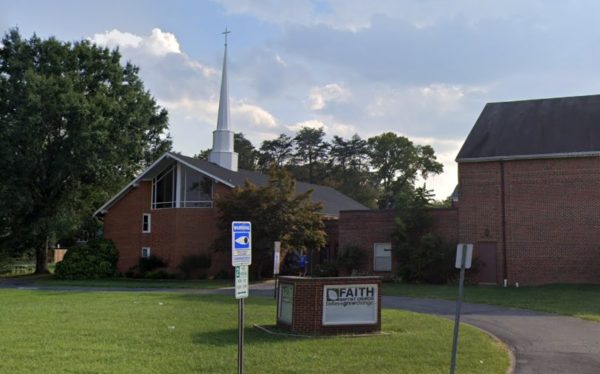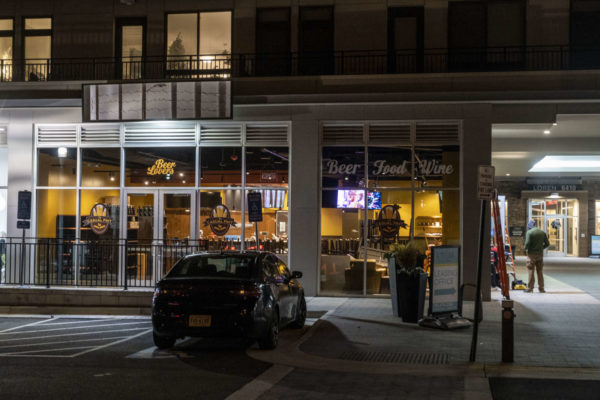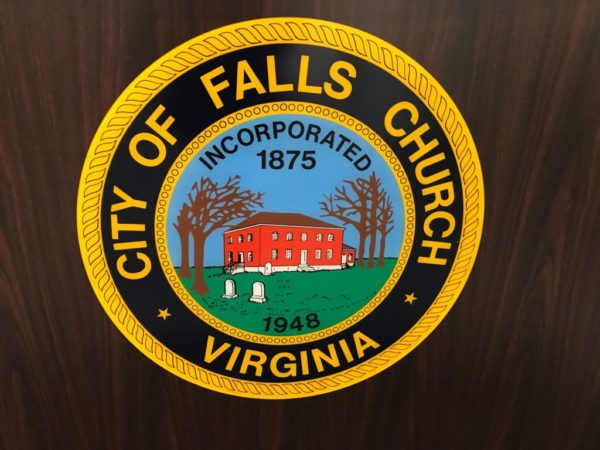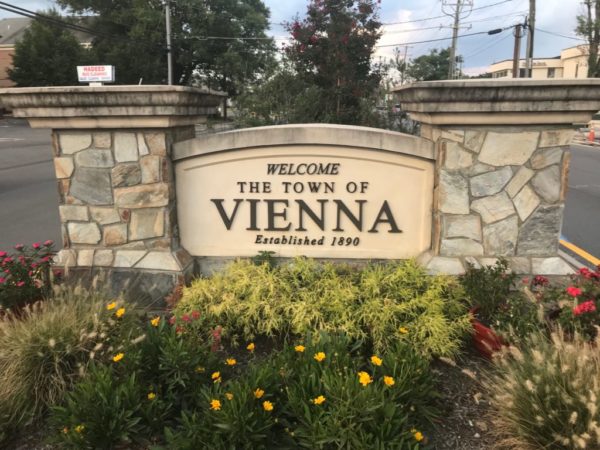
The Vienna Town Council unanimously voted Monday (Feb. 7) to borrow $12 million to fund capital projects, including improvements of roadways, sidewalks, and the recently acquired Faith Baptist Church building.
Of the $12 million in bond funding, $6.7 million will be repaid with meals taxes, $3.9 million repaid with water and sewer fees and $1.2 million repaid by the general fund, Director of Finance Marion Serfass told the council at its Monday meeting.
About 44% of the money will go toward construction improvements to streets and sidewalks, and 33% for water and sewer projects. The remainder of the costs are for smaller facility improvements, like parks and recreation projects, public-use vehicles, and bond issuance costs.
“I do want to say for the record that the town does not undertake borrowing $12 million lightly,” Councilmember Chuck Anderson said. “We have a stellar financial record and that money is cheap, and we’re using these funds for capital improvements that are much needed, so this is actually a very fiscally smart and responsible thing to do.”
Councilmember Ray Brill responded that “money is never cheap” and “there is a cost to the money.”
Serfass told Tysons Reporter that this morning (Thursday), credit rating agencies Moody’s and S&P both reaffirmed their AAA rating of the town, the highest possible rating, because of the town’s likelihood to pay back the debt.
Projects from the $26.5 million 2022 Capital Improvement Plan that will get some of the bond funding include:
- Glen Avenue sidewalks ($1.9 million)
- Asphalt and mill overlay ($1.65 million)
- Glyndon Road SE improvements from Locust Street to Valley Drive ($725,000)
- The Freeman Store and Museum roof replacement ($95,000)
- Glyndon Park playground and parking lot replacement ($300,000 each)
- Faith Baptist Church property improvements ($300,000)
Many of the projects have additional funding allocated in the CIP from the town’s American Rescue Plan Act money or from the Robinson Trust Sidewalk Initiative.
“A good use of the American Rescue Plan Act money is capital projects, one-time projects that don’t require additional funding going forward, so not a new program,” Serfass said at the town council’s Jan. 24 meeting when it approved the CIP. “That really is a benefit to us as a town and is going to allow us to take a little pressure off our debt capacity and off our water and sewer rates.”
Bond funding, including premiums, accounted for $37.6 million of the town’s 2020 CIP, which included about $15 million for the police station renovation, and $9.2 million of the 2018 CIP.
One of the many problems highlighted by the pandemic is the lack of affordable housing, with even short-term job loss leaving many residents unable to pay their rent. As local governments grapple with how to support more housing, one of the options proposed in Falls Church has been a meals tax increase.
The obvious response, presented even by the consultants in Falls Church proposing the increase, is that local restaurants are already in dire straits and many are struggling to make ends meet. The Falls Church City Council quickly dismissed the idea of implementing a meals tax during the pandemic and favored other options presented, like trying to tap into an Amazon-related affordable housing fund.
While the restaurant industry is slowly recovering, stability could be a year away. But the affordable housing crisis is unlikely to be solved before then, and the question of the meals tax could resurface.
Meals taxes can be controversial even under non-pandemic circumstances. In 2016, Fairfax County voters rejected a referendum to implement a meals tax which would have predominately gone to support schools. In 2018, the City of Alexandria increased the meals tax by 1% to support affordable housing.
Staff photo by Jay Westcott
In a meeting about how to help build affordable housing in Falls Church, one potential solution proposed was increasing the meals tax by 1%.
Meals tax increases have been a go-to solution for finding more funding for affordable housing in neighboring jurisdictions like Arlington County. Meals tax increases are frequently contentious even in the best of times, but the Falls Church City Council noted that these are far from the best of times.
Representatives from the hired consultants National Housing Trust and Federal City Council offered 11 recommendations in what they described as a tool box in a City Council work session on Monday. A meals tax was only one of those suggestions, but one most likely to turn heads, as restaurants in the area face devastating losses in revenue.
The consultants argued that increasing the meals tax by 1%, from 4% to 5%, would bring Falls Church in line with the meals tax in other parts of the region and would generate $800,000 for the affordable housing fund annually.
According to the report:
A meals tax is levied on prepared food purchased for consumption at a restaurant or taken to-go. Falls Church already has a meals tax of 4%, which generated over $3 million in revenue annually from 2017-2019 . Currently, all the funds generated by the meals tax are directed into the City’s General Fund. To provide a dedicated and consistent revenue source for the Affordable Housing Fund, Falls Church should consider increasing the Meals Tax to 5%, dedicating the additional 1% in tax revenue to the Affordable Housing Fund. This would represent a much-needed consistent revenue source for the AHF and would generate approximately $800,000 annually for the Fund.
A 5% meals tax is in line with what is levied by other jurisdictions in the area. In the Commonwealth of Virginia, the median meals tax rate is 6%. While neighboring jurisdictions Arlington and Fairfax County currently levy a 4% meals tax, as of 2016, 108 localities in the Commonwealth have instituted a meals tax that is higher than 4%.
The report notes that Alexandria’s meals tax increase was aimed squarely at raising funding for affordable housing, though the report also acknowledged that recent factors could make the proposal untenable in the near term.
The consultants recognize that restaurants nationwide are struggling to survive on reduced revenue caused by COVID-19, and the subsequent limits and restrictions on service that have been imposed to stop the spread of the virus. An increase in the tax at this time could potentially discourage the purchase of food from restaurants at a time when restaurants are operating on extremely thin margins. The implementation of this recommendation should be considered in the long-term, once the restaurant and hospitality industry is under less financial pressure.
City Council member Letty Hardi struck down the idea as soon as the discussion was turned back over to the City Council.
“In regular times I’d be a fan of looking at things like the meals tax or carving funding out of the general fund,” Hardi said, “but I think neither of those would fly currently given how much suffering there is in the community.”
One proposed source of funding that sat better with the City Council was dipping into Amazon REACH Funds — a $75 million funding commitment to support affordable housing in the area and avoid the affordable housing loss associated with the tech giant elsewhere.
“The City of Falls Church should take the opportunity to engage with local housing development owners whose projects are eligible and are able to access the funds to increase housing affordability in the City,” the report said. “The final deadline for a project application is June 15, 2021.”
Maura Brophy, director of transportation and infrastructure for Federal City Council, also said that promoting accessory dwelling units can have a meaningful impact on housing affordability by increasing the supply, but without other interventions and requirements, there’s no guarantee that the accessory dwelling units would be affordable.
“If we can access all $3 million, that will allow us to buy down 60 units for about ten years, and that’s way more than we can produce in a year as-is,” Hardi said. “That feels like we should put pedal to the meddle and go after that free money.”
Despite anticipation of a steep drop off due to the COVID-19 pandemic, the Town of Vienna has managed higher revenue on its meals tax than expected.
The meals tax generated 80% revenue for the first month of the new fiscal year, July, compared to last year. During pre-pandemic months, the monthly average for meals tax was $250,000, while July’s revenue came in at $194,000.
While there have been concerns for lower meals tax through the upcoming colder months, the generated revenue has left the town “pleasantly surprised,” according to finance director Marion Serfass. In preparation for a steeper drop off, the town budgeted for 50% of the pre-pandemic revenue.
Since March, five restaurants in the town have either moved or closed, while only one has reopened.
A contributing factor for the steady meals tax has been the stable business for drive-thru and high-end restaurants. During the pandemic months, there has been “no noticeable” drop off for drive-thru restaurants compared to previous meals tax revenue. The assumption for the trend is that people feel safer utilizing drive-thru restaurants, according to Serfass.
The meals tax revenue — a 3% tax on each meal sold — is used to pay back bonds issued for capital improvement projects.
Though the revenue has been higher than expected and the town is gradually recovering from the effects of the pandemic, there are still concerns about how local businesses may be affected by the pandemic if it stretches into next year.
In a discussion on Tuesday with Vienna Mayor Linda Colbert, and various business and economic leaders, Town Economic Development Manager Natalie Monkou cautioned that businesses might need to adjust to the ongoing health crisis.
“We’re anticipating the health crisis to continue into 2021 and we want to be able to help our business community pivot,” Monkou said.
File photo




